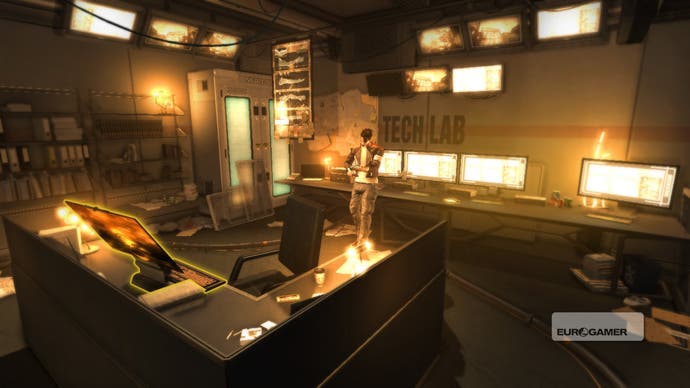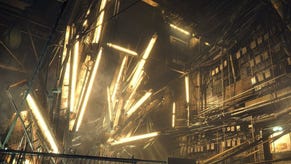Deus Ex: Human Revolution
Praxis makes perfect.
And that's just on the hacking screen. Outside the system, in the real world, you are exposed to any patrolling guard, robot or panning camera while you hack, so the sense of pressure can be doubly acute, and once you're in you can often disable systems or turn them against their owners. One of my favourite things to do in really dense facilities is to find the security control booth and use it as a panic room - if I'm detected then I race back there, mine the doorway, build a wall of boxes and turn the robots against their masters. Once everyone's dead and the alarms die down, the game rewards me for rescuing the situation rather than giving up and reloading.
Some augmentations are things that other games take for granted - for instance, a lot of the stealth options are things like being able to see cones of vision on your mini-map - but while it sounds boring on paper, it's quite the opposite in-game. I have never lusted after something so simple as the ability to lift bigger boxes or jump over a fence as much as I have while staring up at the tempting fire escapes in Detroit alleyways, nor wished for a cooldown timer as much as I do while panicking behind a cardboard box in a hangar full of stompy robots going mental.
Besides, there are plenty of more outlandish augmentations, and their unifying characteristic seems to be that everything helps you do everything. Temporary invisibility is good for passing by cameras and through laser fences, for example, so it's a good stealth ploy, but if it gets you into more weapons caches and security offices, it's also good for blowing stuff up.

The world around you is exactly the sort of place where all of this makes sense, too. Caught somewhere in the thematic crossfire between Blade Runner and Metal Gear Solid, every person, discarded eBook and billboard poster is obsessed with augmentation, and every architect is obsessed with latticeworks of underfloor ducting, vents and open-plan offices overseen by walkways. It's one of those video game worlds that's so comfortable being a video game world and so good at it that it feels confident enough to mock itself from time to time in a stray email or fragment of incidental dialogue.
The story at the heart of the game fits as snugly as Jensen's wrap-around retractable sci-fi sunglasses, too, thickening and twisting like cream cheese in a ditch being attacked by a gang of angry hammers. Side missions that flesh things out further are strongly signposted and give you more insight into Jensen's past as a Detroit city SWAT leader and his early life. If you're one of those guys BioShock creator Ken Levine calls 'archaeologists' who like to turn over every stone and then rub it against your brain, you won't be disappointed by what you find hidden around the edges.

Deus Ex: Human Revolution is probably not as perfect as I'm making it sound. Some of the rules about what's interactive and not seem quite arbitrary, which is a pretty blatant failing in a game which tries so hard to make you feel like you're not being restricted, and while the level design is clever and varied, the interior design definitely is not, and there's also a lot of repetition in the incidental details. Sure, it's important to hear some of those looping news broadcasts, but maybe make them longer than half a minute or record variations or something.
But the important point is that Deus Ex: Human Revolution is one of those rare games that knows you can't be perfect all the time, and that you have the right to change your mind about your actions later. It just wants to be played with and enjoyed - and when you finish, you just want to play with it again.








